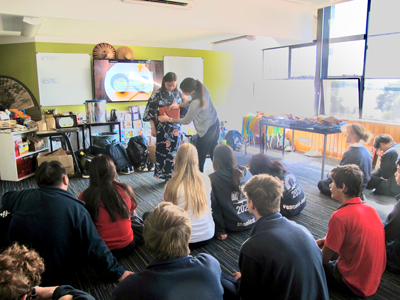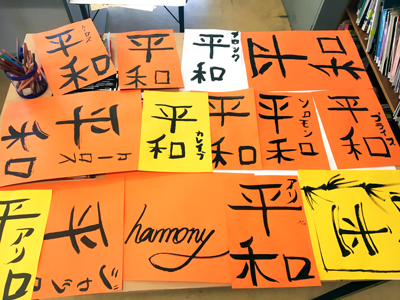2021 Japanese-Language Assistants’ Report: Teaching in Primary and Secondary Schools in Tasmania
The Japan Foundation, Sydney (Hobart)
ORIHARA Yumi
Tasmania, where I have been posted, is one of the states of Australia, and is a vast island, larger than Kyushu and slightly smaller than Hokkaido. In Tasmania, I have been visiting schools around the state in order to support Japanese language teachers and students.
Activities in Tasmania
My main responsibility is to visit schools, from elementary to high school, in Tasmania to support their Japanese language programs and classes. I teach Japanese language and culture to students while team-teaching with local teachers. The support varies, and includes conversation demonstrations, Japanese language correction, preparation of teaching materials, and syllabus consultation. I have often been asked to teach classes on Japanese culture, and have spoken on various topics, such as the tea ceremony, calligraphy, how to wear yukata, Japanese cooking, samurai, and Japanese events.

Grade 9/10 (equivalent to the 3rd year of junior high school students and the 1st year of high school students in Japan)
classes experience tea ceremony and yukata.
When we shifted to online classes due to COVID-19 (March to June 2020), I participated in online Japanese classes and created video materials for online classes.
Support for Local Teachers’ Network
One of our duties is to support the local Japanese language teachers’ network. I participate in regular meetings to discuss the organization of events and serve as a judge for the state speech contest by the teachers’ network. I sometimes lead workshops at “Professional Learning” (teachers' study groups).
The teachers’ network includes teachers from Hobart and other areas of the country. However, due to the fact that teachers are very busy and the distance between regions is very great, the connection between teachers is not that strong. As a Japanese-Language Assistant who visits many schools across the region, I hope I can become a conduit of teachers.
Activities at the Japan Foundation, Sydney
I am also occasionally involved in the work of the Japan Foundation, Sydney. In the Japanese-language teacher training held twice a year at the center, I also go to Sydney to lead a session to introduce Japanese trends. (Japanese-Language teacher training in 2020 has been canceled due to COVID-19.) I also sometimes participate in regular meetings online or help with online seminars.
In March 2021, staff from the Japan Foundation, Sydney visited Tasmania, and together we put on a Japanese cultural experience event called “Tasmania Nihongo Roadshow.” In this event, we spent a week traveling across Tasmania and held sports events, yosakoi dance, and furoshiki workshops. The events were very well received by both the local teachers and students, and we felt a great sense of accomplishment when we finished the events.
Although I was posted to Tasmania alone, I have had the opportunity to meet with people from the Japan Foundation, Sydney, as mentioned above, and I feel supported. In addition, I have regular online meetings with Japanese-Language Senior Specialists in Sydney who advise me on my work, which reassures me as I tackle my work in Tasmania.

"Heiwa" written in calligraphy class on Harmony Day (March 21).
Future Challenges
I have visited schools throughout Tasmania, and while I feel that Japanese is popular among foreign language subjects, I have also seen schools that look likely to lose their Japanese (foreign language) programs. In order to improve Japanese language education in Tasmania, I believe that support for teachers as well as advocacy towards schools, principals and parents is necessary. In the remainder of my term, I would like to work as a Japanese-Language Assistant, thinking about how I can promote Japanese to the entire school system, in addition to supporting the teachers.
- What We Do Top
- Arts and Cultural Exchange [Culture]
- Japanese-Language Education Overseas [Language]
- Japanese-Language Education Overseas [Language] Top
- Learn Japanese-language
- Teach Japanese-language
- Take Japanese-Language Test
- Know about Japanese-language education abroad
- The Japanese-Language Institute, Urawa
- The Japanese-Language Institute, Kansai
- Japanese-Language Programs for Foreign Specified Skilled Worker Candidates
- Japanese Language Education for Japanese Children Resident Overseas and for the Descendants of Migrants
- Archives
- Japanese Studies and Global Partnerships [Dialogue]
- JF digital collection
- Other Programs / Programs to Commemorate Exchange Year
- Awards and Prizes
- Publications
